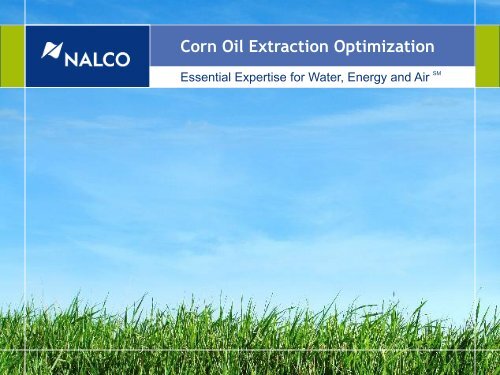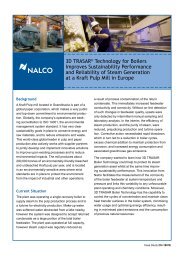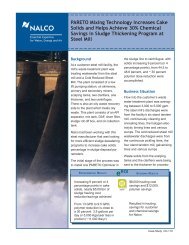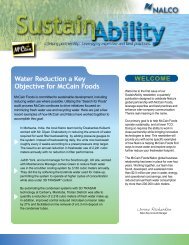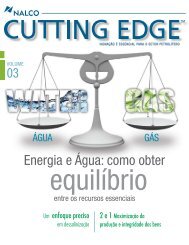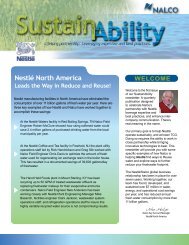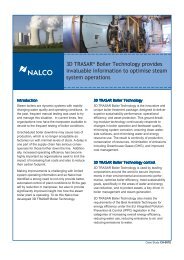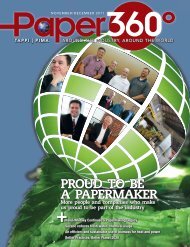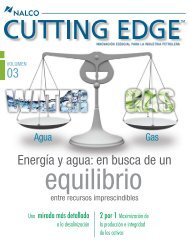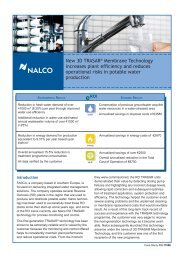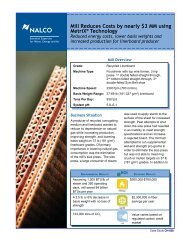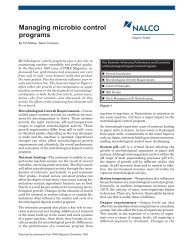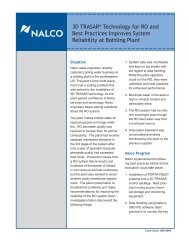Corn Oil Extraction Optimization - Nalco
Corn Oil Extraction Optimization - Nalco
Corn Oil Extraction Optimization - Nalco
You also want an ePaper? Increase the reach of your titles
YUMPU automatically turns print PDFs into web optimized ePapers that Google loves.
Essential Expertise for Water, Energy and Air SM<br />
<strong>Corn</strong> <strong>Oil</strong> <strong>Extraction</strong> <strong>Optimization</strong><br />
Essential Expertise for Water, Energy and Air SM<br />
1
COE <strong>Optimization</strong> - Overview<br />
• Technology review – TSC & GR 8109<br />
• Product development<br />
• Chemistry – Not an equipment solution.<br />
• Production improvements<br />
– Both centrifuge types benefit from additive<br />
• Regulatory needs and requirements.<br />
• Market drivers – If commodity prices come down<br />
will additive continue to be cost effective?<br />
Essential Expertise for Water, Energy and Air SM<br />
2
Thin Stillage Clarification with <strong>Corn</strong> <strong>Oil</strong> Recovery<br />
Designed to increase the separation of thin stillage suspended<br />
solids at dry grind corn ethanol plants<br />
Thin Stillage<br />
Increased ethanol production through backset quality improvement<br />
Energy savings through improved evaporator & Dryer performance<br />
Improved co-product recovery - DDGS and concentration of corn fats,<br />
oils, and greases<br />
Flocculants<br />
Essential Expertise for Water, Energy and Air SM<br />
Patent Issued March 3, 2009<br />
US Patent 7497955<br />
Separation<br />
Equipment<br />
<strong>Nalco</strong> has over 60 years experience in separation technologies<br />
3
Essential Expertise for Water, Energy and Air SM<br />
Product Development<br />
• Experiences from TSC with COE allowed for product<br />
formulations to met regulatory for animal feed and<br />
allow for higher oil recovery on existing corn oil<br />
centrifuges spinning syrup (concentrated thin<br />
stillage).<br />
• <strong>Nalco</strong> studied products for years while conducting<br />
whole stillage and thin stillage research.<br />
• In the last 6-9 months, the use of these products has<br />
finally become economically favorable.<br />
• The need to meet hurdle rates on capital invested<br />
has also increased plants awareness of higher oil<br />
yields.<br />
4
Essential Expertise for Water, Energy and Air SM<br />
Production Improvements<br />
• Many of todays corn oil recovery systems are<br />
under performing.<br />
– Some producers may have seen oil yield (lbs oil/bushel)<br />
drop when compared to last years oil yield numbers.<br />
• Today plants can recover 0.1 – 0.6 lbs/bushel<br />
without any chemical additive.<br />
• Additive can help the producer increase yield by<br />
adding 0.2 – 0.4 lbs/bushel.<br />
• Net return to the plant is very dosage dependant.<br />
– Some plants return a net $6 in oil revenue/$1 spent on<br />
additive, others may return net $2 in oil revenue/$1 on<br />
additive.<br />
– It all depends on your starting point.<br />
5
Essential Expertise for Water, Energy and Air SM<br />
Production Improvements<br />
• No matter where your oil yield starts, additive can<br />
help;<br />
– Improve oil quality –<br />
– Reduce Variability in COE operation.<br />
– Increase oil yield.<br />
One<br />
Pound<br />
Syrup<br />
lb/bu 0.24 0.4 0.44 0.46<br />
6
Essential Expertise for Water, Energy and Air SM<br />
Production Improvements<br />
• Additive helps both disk stack and tricanter<br />
designs.<br />
• Important to determine optimum dosage of<br />
additive to get the highest return on your<br />
investment.<br />
7
Essential Expertise for Water, Energy and Air SM<br />
Production Improvements<br />
• ROI and Net return needs to be considered with<br />
using any additive.<br />
• Feeding highest dosages to recover highest gpm of<br />
oil is not always best.<br />
• Sometimes additive cost consumes extra oil<br />
revenue.<br />
GR-8109<br />
PPM<br />
GR-8109 <strong>Oil</strong><br />
Produced<br />
GPM<br />
Base <strong>Oil</strong><br />
Produced<br />
GPM<br />
<strong>Oil</strong> Gain<br />
GPM<br />
Net Increase<br />
$/day ROI/Day<br />
Lbs oil/bu<br />
w/GR-8109<br />
100 2.2 1.75 0.45 $ 1,781 262% 0.48<br />
200 2.5 1.75 0.75 $ 2,742 201% 0.55<br />
300 2.9 1.75 1.15 $ 4,249 208% 0.64<br />
400 3 1.75 1.25 $ 4,115 151% 0.66<br />
500 3.1 1.75 1.35 $ 3,981 117% 0.68<br />
lbs oil/bu<br />
Baseline<br />
0.38<br />
0.38<br />
0.38<br />
0.38<br />
0.38<br />
Lbs oil/bu<br />
Net Gain<br />
0.10<br />
0.16<br />
0.25<br />
0.27<br />
0.30<br />
8
Essential Expertise for Water, Energy and Air SM<br />
Production Improvements<br />
• When additives are used, you can see large<br />
incremental gains in oil production to a point and<br />
then gains begin to level off.<br />
9
Regulatory Requirements – You are what you eat!<br />
• Ethanol plants need to be aware of process contact with animal<br />
feed<br />
• Chemical products needs to be safe for animal feed<br />
– GRAS (Generally Recognized As Safe) Currently listed in<br />
CFR as GRAS for animal feed 21 CFR 582 or 584.<br />
– Self certified GRAS<br />
• <strong>Nalco</strong> uses Keller & Heckman as third party verification<br />
– CVM (FDA review- not required for compliance with feed<br />
regulations)<br />
• Not all animal rations are created equal (dietary exposure as a<br />
determination of safety is dependent on % use in animal feed, and<br />
the feed consumption factor for individual animal species)<br />
• Approvals are application specific<br />
– It is the intended use of a substance, rather than the substance<br />
itself, that is eligible for GRAS. If a product is GRAS for one<br />
use, it is not necessarily GRAS for all uses.<br />
– Application influences concentration in the final feed due to<br />
varied chemical usage levels, points of application, end<br />
product feed rations.<br />
– Cumulative exposure is also considered.<br />
Essential Expertise for Water, Energy and Air SM<br />
10
How does <strong>Nalco</strong> Determine Safety<br />
• Use the principles set forth in the Title 21 Code of Federal<br />
Regulations part 570.30 to establish GRAS status for<br />
process aids.<br />
– Outside consultants act as our Scientific Panel of Experts<br />
per 21 CFR 570.30(a)<br />
– Each and every component of the product is reviewed for<br />
compliance status as well as the suitable purity of the<br />
additive for said use.<br />
– Conservative (worst-case) assumptions are applied for end<br />
use and process parameters to estimate maximum<br />
concentration of chemical in final feed component.<br />
– Review of the component hazards in relation to the dietary<br />
exposure for all livestock animals is evaluated to ultimately<br />
determine safe use.<br />
• Assumptions and allowable maximum dosage levels are<br />
clearly communicated on product literature to ensure safe<br />
use at the customer level<br />
Essential Expertise for Water, Energy and Air SM<br />
11
Communication – Product Safety<br />
In Section 15 of the MSDS<br />
Essential Expertise for Water, Energy and Air SM<br />
12
Communication – Product Safety<br />
Information on product label.<br />
Essential Expertise for Water, Energy and Air SM<br />
13
<strong>Corn</strong> <strong>Oil</strong> <strong>Extraction</strong> <strong>Optimization</strong><br />
• If you decide additive is something you want to<br />
try, please remember:<br />
– All species of animals that may include your corn<br />
oil or DDGS in their diets need to be covered under<br />
GRAS.<br />
– All mechanical, operational, and chemical aspects<br />
of your COE system need to be optimized.<br />
– ????<br />
Essential Expertise for Water, Energy and Air SM<br />
14
• Questions ??<br />
Essential Expertise for Water, Energy and Air SM<br />
15


